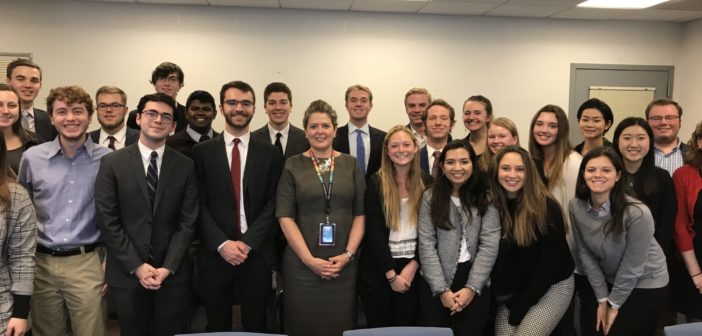Lehigh had set its sights on a dream.
Key university stakeholders had collaborated in 2012 to outline the potential structure of a sustainable development program.
The pieces had come together. Funds for the program were secured through commitments by the College of Arts and Sciences, the P.C. Rossin College of Engineering, the Provost Office and the Office of International Affairs.
All that was needed was the right person to lead the program: Mark Orrs of Columbia University, one of the first doctoral students to graduate with a degree in sustainable development, was hired. Orrs was mentored by Jeffrey Sachs, a “world-renowned” professor of economics at Columbia, sustainability leader and senior United Nations adviser. Sachs was a co-recipient of the 2015 Blue Planet Prize, “the leading global prize for environmental leadership,” and has been named among Time Magazine’s 100 most influential world leaders twice.
Seven years later, the sustainable development (SDev) minor program has been eliminated.
Over time, several funding sources within the university pulled out, and the program was hurt by the inability to attract external grants or donations to sustain the program. The program was officially placed on “hiatus” in September 2018, according to an annual report of the minor obtained by The Brown and White.
Morris, who took over for Orrs as the SDev program director after Orrs left in August 2018, said he was pulling “double duty” this semester teaching his normal earth and environmental sciences courseload with the SDev courses. He said he wouldn’t be able to do this for another semester and requested funds to hire a new SDev director, but his request was denied and he was told the program would end.
The report found the budget situation for the sustainable development program was “exacerbated by mismanagement and by the SDev program’s inability to secure external funding” along with “changes in leadership” in engineering, CAS and International Affairs.
Orrs said he faced challenges in identifying applicable grants to sustain the program and in courting large donors to fund the estimated $5 million endowment needed to stabilize the program.
But still, he attributed the program’s demise to the lack of support from university administrators. He said the program made multiple requests for a more reliable, permanent line of funding for the SDev program on the order of $200,000 per year from the provost’s office. The requests were denied each time.
“By the time I was leaving, it did not seem the program would continue,” Orrs said. “The provost was never the biggest champion of the program itself, I’m not sure he ever really got it. He was supportive, but he wasn’t a champion — it wasn’t a priority of his.”
Orrs said “the writing was on the wall” when David Wu, Lehigh’s former dean of the engineering college, was replaced with Stephen DeWeerth, the college’s current dean, who Orrs said inherited a large operating deficit and didn’t have the “interest” in the program. Then with the decision by International Affairs to end its funding support in 2013, the program quickly became financially compromised.
Provost Pat Farrell and DeWeerth both did not respond to a request for comment, and President John Simon deferred to other sources. Cheryl Matherly, the vice president and vice provost for International Affairs, said it was her predecessor Mohamed El-Aasser who made the decision to end that office’s funding for the program in 2013.
Orrs said the idea of starting a master’s program in sustainable development to help fund the undergraduate program was in the works during his time at Lehigh. He said after concerns the master’s program would not draw enough students to finance both itself and the undergraduate program, an external study was commissioned. Orrs said the analysis “came back favorable,” as it determined the master’s program would need 15 full time students to break even.
However, Orrs said the university decided not to pursue this option.
“Sustainable development was originally conceived as a university-based program and it was hoped that a broad collection of faculty across colleges would participate. The level of faculty participation necessary to sustain the program did not occur,” Robert Flowers, the new dean of the College of Arts and Sciences, said in an email.
Flowers added that one of his goals as dean is to assess faculty expertise and interest in sustainability, and an early survey of faculty found more than 60 faculty members in CAS have identified research in sustainability. He hopes to leverage that interest to “create a new curriculum in sustainability.”
But some students aren’t satisfied with the administration, both in their decision and in their transparency on the issue.
Nadine Clopton, ‘19 ‘20G, a graduate of the sustainable development minor, was recently named the youngest director of the U.N. NGO/DGC executive committee. She said she has formed the Committee on Sustaining Sustainable Development, and is organizing Lehigh students, faculty and alumni in order to provide perspective about the impact of the program and to urge the administration to “reconsider this decision and reverse the university’s course of action accordingly.”
Clopton said she has heard from more than 30 people lending their support and offering testimonials of their experience in the program.
“I can assure you that this decision is incredibly short-sighted and will resonate poorly throughout the policy, international cooperation and U.N. world,” Clopton said.
Morris expressed concern about Lehigh’s reputation on the global stage, too, considering Lehigh’s U.N. partnership. Lehigh was the sixth university in the world to be designated an NGO by the U.N. in 2004.
Morris said that after the U.N. adopted its Sustainable Development Goals of 2015, the international organization has increasingly focused on sustainable development. Lehigh’s previous commitment to sustainable development helped provide the university with “exclusive opportunities to participate in U.N. programs… at the highest levels.”
But after the elimination of the minor, Lehigh will now need to cut or scale back its involvement in these U.N. programs, Morris said. For example, Lehigh has hosted the “Global Classroom” for the U.N.’s Sustainable Development Solutions Network. The course, facilitated by Morris, is streamed digitally to more than 35 universities worldwide. Because SDev provided the funds to involve Library & Technology Services in the digital logistics and bandwidth, the Global Classroom will now “likely be hosted by another member of the global network,” since SDev can no longer fund such an initiative.
Another initiative will likely not move forward in its original form because of the elimination of the SDev program. Lehigh’s close relationship with the Antiguan government was prepared to result in a laboratory where Lehigh students, staff and faculty could identify sustainable development challenges and work with Antiguans to innovate solutions.
“The most challenging issue is that Lehigh’s cancellation of the SDev program raises serious credibility problems and undermines our leadership on this issue,” Morris said. “If our own institution is stepping away from sustainable development, how effective can we be in globally promoting sustainable development programs with other academic institutions?”
There are other possible implications related to Lehigh’s elimination of the minor. Lehigh fills out the Sustainability Tracking, Assessment and Rating System (STARS) report. The report scores universities on five broad categories to determine holistically how committed institutions are to sustainable practices.
The five categories include academics, engagement, operations, planning and administration, and innovation and leadership. The entire report consists of about 200 possible points, and awards an institution bronze, silver, gold or platinum depending on the score. Lehigh is rated as a silver institution.
Katharine Targett Gross, Lehigh’s sustainability officer, said Lehigh’s courses in SDev have contributed to the academics section of the university’s report.
“If ending the program means a reduction in the course options on the subject of sustainability, that would potentially lower their score in that section,” said Julian Dautremont, the director of programs at the Association for the Advancement of Sustainability in Higher Education. AASHE is the organization that administers the STARS report.
Morris said sustainable development is an intergenerational challenge that has proven to capture “real interest from students.” He said the program involves all corners of the institution, from technology and innovation in the engineering college to policy solutions in arts and sciences to financing sustainable development and educating others on the matter.
“Students from every college can benefit from this coursework and then in turn benefit society,” Morris said.
Morris said about 150 students were enrolled in SDev courses in 2019.
Rachel Condon, ‘22 is one such student.
Condon, an environmental engineering major, said she became interested in Lehigh’s SDev program after she attended the Lehigh winter break trip to Costa Rica, a joint program between the earth and environmental sciences department and SDev.
Condon took the intro class in sustainable development and continued to enjoy the program. Though Morris is offering an independent study next semester to help students complete the 15-credit minor, Condon only has seven credits right now and won’t be able to finish the program before its elimination.
“Sustainable development is something that we really need to be focusing on as a human race, so not being able to offer it and teach students about sustainable development and how we should be pursuing sustainably is disappointing that we don’t teach it,” she said. “It’s really important that we at least offer it.”
Riley Walters, ‘20, is a senior accounting and finance major with the SDev minor. Walters said she doesn’t understand why the university won’t fund the program and that the decision makes her think “Lehigh doesn’t really care about sustainability.”
“They stopped accepting new applicants (for the minor) shortly after I declared, and I didn’t really know what that meant but it was very confusing,” Walters said. “But I think it was their way to make it fade away because they obviously don’t want publicity about this, so I think the more publicity we can make about this, the better, because this doesn’t really look good for them.”
Clopton said she finds it “unacceptable” that such a decision was made without any consultation from students, and said sustainable development is the “21st century’s most important discipline.”
“The decision to end this program would steer Lehigh far off the Path to Prominence,” she said.
This report was compiled by The Brown and White’s Investigative Team.






Comment policy
Comments posted to The Brown and White website are reviewed by a moderator before being approved. Incendiary speech or harassing language, including comments targeted at individuals, may be deemed unacceptable and not published. Spam and other soliciting will also be declined.
The Brown and White also reserves the right to not publish entirely anonymous comments.
5 Comments
So what do this coursework entail? Specifically what does a student learn in this curriculum?
Oh, you know. Sedition, collective farming, how to run a mimeo and shortwave, the usual. Go back to sleep.
So glad to hear students are challenging this decision. Don’t give up the fight! Have you reached out to students in the school of business and to the Iacocca Institute? So much future economic development depends on sustainability: longer life batteries with disposal issues taken care of; autos; food — every sector of our economy will be transformed. There are also potential applicants on College Confidential talking about their interest in the program.
I wish all relevant people would recognize the good investigation and reporting in this article that indicates, amidst a myriad of complications, how global warming and other sustainability Issues of our world society’s form into our most urgent problems and should have our highest priority of attention for remediations!
I thought Lehigh has been leading or trying so in these causes but it seems we’ve diluted our foci or talents or demoted our interests. I hope with Lehigh’s coming change of provost we get back on tracks with our full accelerations and powers to help reduce global warming as much as possible and help lead to other remediations for our world’s sustainability!
Good story, Jordan.
However, if you’re setting your sights on a dream, you don’t hire a graduate student to go out and find the $5M it’s going to take to sustain your dream. It sounds like what happened was some faculty and possibly a dean-type person wanted a sustainability program out of a combination of real desire and fear of missing the boat; nobody wanted to commit actual money, and the offer from admin was ridiculous: either do nothing or spend tiny money to hire an academic kid with a rich academic daddy, and hope daddy’s friends will give money. Whoever really wanted this to work said okay, then rallied the troops from various departments, who’re already annoyed by the amount of work they’re being asked to do that will not help their own careers or departments, so he had to say “just give us x years while we make this sustainable.” (“Sustainable” in university terms means a program brings in its own money.)
It was unlikely from the start. No donors are going to talk seriously, if at all, with a graduate student about money of that size, not least because it makes it so obvious that Lehigh has no real commitment. Nor will a graduate student who has no real program yet be able to raise that kind of money from agencies. You don’t send grad students after $5M, you send department chairs, deans, and occasionally presidents.
It’s a garbage way of behaving not least because of how it uses young academics. This guy was hardly started and Lehigh came with what looked like an AMAZING OFFER that was really an amazing opportunity to get a young career smashed into a wall. And that’s not a one-off for Lehigh — not too long ago I was scolding someone for looking for a postdoc to run some impossible project stitching together several colleges in a program that nobody asked for. Trying to get buy-in from profs who’ve been in the business 10-30 years and can see what kind of ride they’re being asked to go on…why would you set a young academic up that way? It’s not just unkind, it’s potentially damaging to a career that this young person’s put 5-10 years and who knows how much borrowed money into.
Anyway, I hope he makes a good recovery, if academia is still what he’s after, rolls on publishing, and finds an assistant prof spot somewhere.
Flowers, if he’s talking that way, doesn’t sound serious about making a sustainability program at Lehigh. Flowers is anxious to raise Lehigh’s research profile and get fat grants, and make Lehigh more research intensive, meaning the graduate programs become much more important, and the science profs in A&S become much more important as scientists. That’s his focus. An undergraduate program in sustainability is not a platform from which to bring in serious research money. What he might do is academia’s usual plan for making a new undergrad program for which there’s some demand, which is to stitch together courses that already exist (maybe enviro sci, poli sci, a few others), add a new course or two (environmental journalism, maybe), make it distinct enough from whatever exists that they don’t start a new border war, and repackage the whole thing as the “Sustainability minor”. It will not have a dedicated director arranging all these things with the UN and whatnot, but the credential will exist.